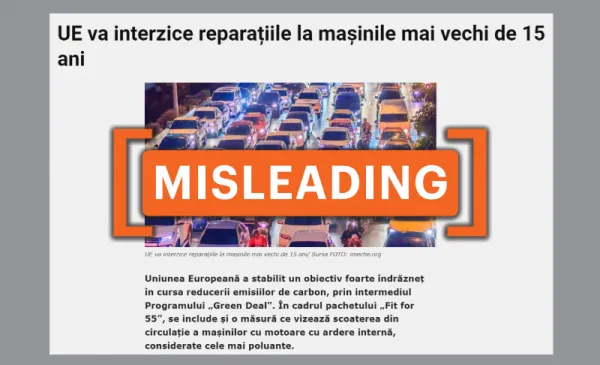By: Nicoleta Banila
March 7 2024
 (Source: National/Screenshot by Logically Facts)
(Source: National/Screenshot by Logically Facts)
The EU is working on legislation to ease the disposal of vehicles beyond repair and make it easier for owners to repair their cars.
What is the claim?
Various Romanian online outlets have published stories claiming that the European Union (EU) plans to ban repairs for cars older than 15 years and will make owners send them to the junkyard as part of its "Fit for 55" legislation package.
The misleading reports state that starting in 2035, such cars will be categorized as "residual vehicles," with repairs banned. Most of them quote EU legislation as their source of information, while a few are based on foreign or other local media reports.
These stories were shared on these outlets' social media channels and then re-shared by users, garnering a significant number of comments from owners concerned at the prospect of losing their cars. One outlet deleted the initial post, but the story is still active on Facebook, and has over 100 comments.
Such narratives have spread across EU countries previously, including Spain, Sweden, as well as in the U.K. In Romania, anti-EU sentiment has started to increase in the last two years, largely driven by a rising sovereigntist political movement that mixes nationalism and populism and spreads disinformation, especially regarding narratives critical of the West.
What is the truth?
In July 2023, the EU announced plans to regulate how cars are designed, made, and handled when they are no longer used, as part of its efforts to meet emission reduction goals under the "Fit for 55" legislation stipulating that by 2035, all EU member states must shift solely to electric vehicle production.
To this end, there is a significant emphasis on enhancing existing vehicle fleets by introducing the concept of "end-of-life vehicles" (ELV). The legislative project says that a vehicle will be considered as an ELV when it is technically or economically irreparable, according to very specific criteria.
For example, a car might be deemed beyond repair due to irreversible structural damage and financially impractical if the repair costs exceed its market value and requirements for roadworthiness in its country of registration before repair.
The specific criteria aim to ensure that ELVs are not exported fraudulently as second-hand vehicles, the European Commission’s office in Romania told Logically Facts.
EU affairs news outlet Euractiv also confirms that this is what the EU legislation sets out to do.
Every year, 3 to 4 million old cars disappear from EU statistics, many illegally exported and sold as "used cars," while they are no longer legally usable, to circumvent the EU’s waste legislation that obliges companies to dispose of waste vehicles properly.
Moreover, the Commission added that the criteria to determine whether a vehicle is an ELV does not place any requirements on the vehicle based on its age, type, brand, model, origin, or ownership. If a car needs a repair, any part may be changed as long as the vehicle is fit to pass roadworthiness inspections and remains authorized to operate on EU roads.
This is also confirmed by what the European Commission further told Logically Facts, namely that nothing in the proposed legislation would prevent the reparation of cars of any specific age, including classic cars. On the contrary, several provisions are intended to facilitate repairs. The regulation also provides measures to improve the availability, quality, and traceability of second-hand spare parts, so that vehicle owners and car repair facilities are able to find and use spare parts more easily.
“You can always have your car repaired if you wish, even if it is not economical. If, however, you possess a car that is broken beyond repair, the proposed regulation would specify that you have to dispose of it responsibly by delivering it to a treatment facility for disposal, rather than, for example, leaving it to rot somewhere in nature or even in your garage where it would leak toxic substances and waste precious resources,” the Commission said.
The only obligation for owners of cars that become ELVs is to deliver them to an authorized treatment facility once they receive information proving that their vehicle cannot be repaired any longer.
The verdict
The EU does not plan to prohibit owners from repairing their old cars but intends to make owners of vehicles deemed irreparable dispose of them in specialized facilities. Therefore, we have marked this claim as misleading.